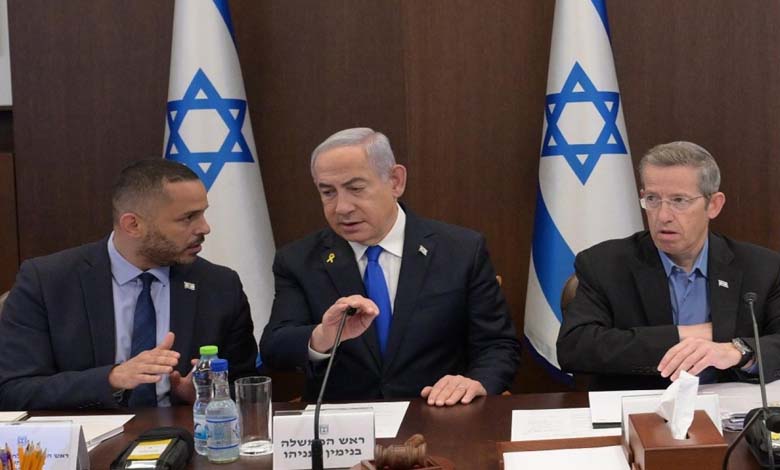Pressure on Netanyahu: Will Hostage Videos Pave the Way for a Prisoner Swap Deal?

As public anger rises in Israel, pressure is mounting on Prime Minister Benjamin Netanyahu‘s government to reach a prisoner exchange agreement and implement a ceasefire.
-
Netanyahu Considering Gaza Annexation or Encirclement if Truce Talks Fail
-
Netanyahu denies Gaza famine, Trump responds… but the facts on the ground speak for themselves
New footage showing emaciated Israeli hostages held in Gaza has horrified Israelis and increased pressure on the Prime Minister to strike a deal with Hamas, even as his government considers another expansion of the war, which has now lasted for 22 months.
The videos were released as international experts warn of a “worst-case famine scenario” unfolding in the coastal Palestinian enclave, where Israel’s offensive has killed tens of thousands of Palestinians and made the safe delivery of food and humanitarian aid nearly impossible.
Images of starving Palestinians have also triggered global condemnation of Israel’s conduct.
-
Netanyahu Caught in the Military Trap over Gaza: Generals Rebel, Soldiers Absent
-
Support is waning… A major shift in US Democrats’ stance toward Netanyahu
Israel’s Response
In a video released by Islamic Jihad, hostage Rom Braslavsky — kidnapped during the October 7, 2025 attack — is seen writhing in pain somewhere in Gaza. In another clip released by Hamas, hostage Eviatar David is seen digging what he claims is his own grave and speaks of days without food.
“You watch your child dying before your eyes and can do nothing… it’s unbearable,” Rom’s father, Ofer Braslavsky, told the Associated Press. He added that in the latest video, his son looked like he was “waiting to die,” compared to an earlier video where he still held out hope.
The footage prompted tens of thousands of Israelis to take to the streets in one of the largest protest waves in recent months, calling for an immediate deal to return the hostages and end the nearly two-year-long war.
-
To Resolve the Gaza Truce Deadlock: A New Map on Netanyahu’s Table
-
No Concessions… Netanyahu Sets Conditions for Palestinian Autonomy
Netanyahu’s Government Reviews War Objectives
Following the video releases, Netanyahu said he would raise the hostage issue during this week’s cabinet meeting, reaffirming his three key war objectives: “eliminate Hamas, retrieve the hostages, and ensure Gaza no longer poses a future threat.”
However, his plan to continue the military campaign is facing increasing opposition from Israeli security officials and intellectuals, according to the Associated Press.
With international organizations warning of imminent famine in Gaza, hostage families have warned that food shortages now threaten the lives of those still held captive. Fewer than half of the hostages are believed to be alive; the others are thought to have died during the initial attack or while in captivity.
-
Western Sanctions Threats on Israel Rattle Netanyahu
-
Hamas Hezbollah and Houthis: Netanyahu Unveils His Vision to End the Gaza War
Hamas has expressed its willingness to respond “positively” to ICRC requests to deliver food to the hostages, provided that humanitarian corridors are opened “on a regular and permanent basis” across Gaza. The group denied deliberately starving hostages, claiming they suffer the same hunger as ordinary Palestinians.
Israel has requested an emergency UN Security Council session on the hostage issue, and the Israeli Foreign Minister has announced his travel to New York to attend the meeting.
-
More than Half of Gaza under Netanyahu’s Control… Morag Encircles Rafah to ‘Strangle’ Hamas
-
The Weapon of Hunger: Netanyahu Threatens Gaza with an Even Greater Humanitarian Catastrophe after Halting Aid
Famine in Gaza
Israel blocked all food, medicine, and other goods from entering Gaza from early March until mid-May, before partially easing the blockade on the enclave of some two million people.
According to the UN, nearly 1,400 Palestinians have been killed while seeking aid during this period, most by Israeli forces as crowds rushed toward relief distribution points run by a U.S. company supported by Israel. The Israeli military claims it only fired warning shots.
-
The Reason behind Netanyahu’s Refusal to Allow the Entry of ‘Caravans’ and Heavy Equipment into Gaza
-
October 7 Losses Extend Beyond the Battlefield… Widespread Calls for Netanyahu’s Resignation
Yesterday, Gaza’s Health Ministry announced five more adult deaths from malnutrition in the past 24 hours. The ministry has recorded 87 adult and 93 child deaths from hunger-related causes since late June.
The war in Gaza has killed more than 60,900 Palestinians, according to the local Health Ministry.
The conflict began with a surprise Hamas attack on Israeli border towns, killing around 1,200 people and taking more than 250 hostages.












